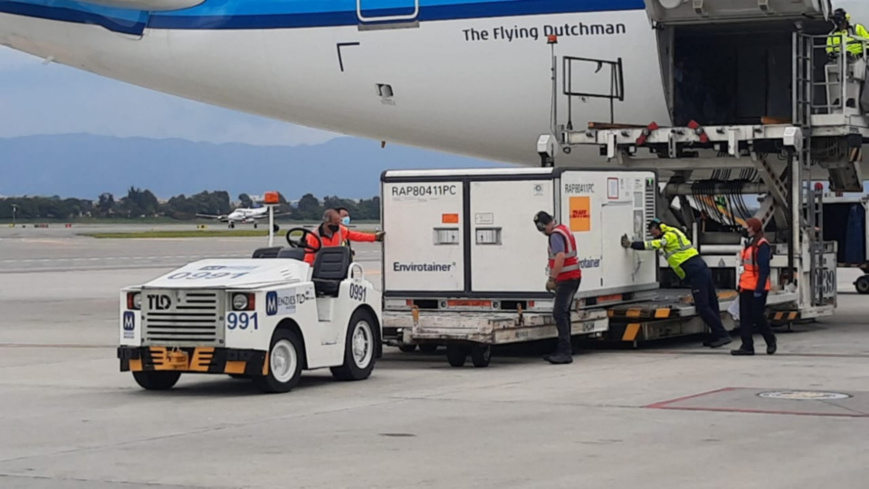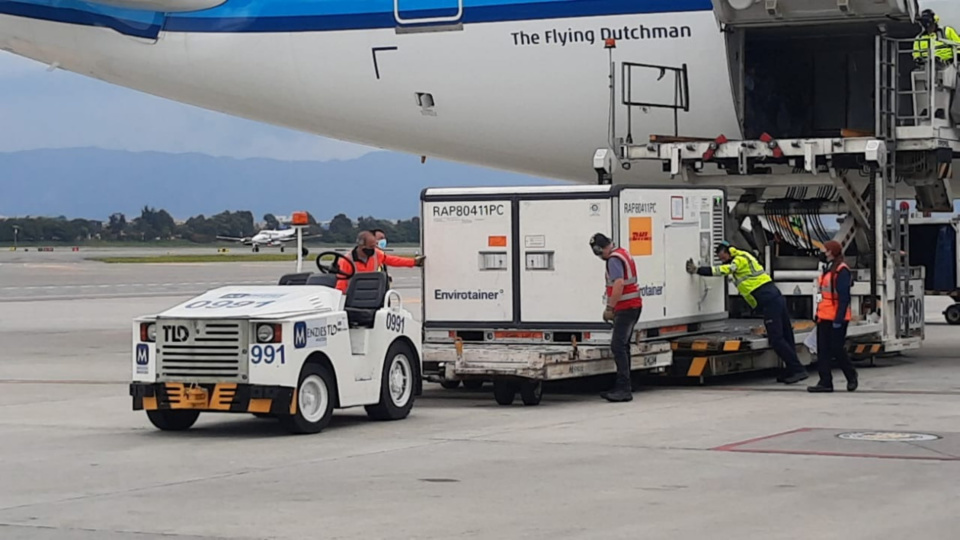By Yan Yu, People's Daily Overseas Edition

A batch of COVID-19 vaccines produced by Chinese biopharmaceutical company Sinovac Biotech Ltd. arrive in Bogota, capital of Colombia, Feb. 20, 2021. (Photo/Official website of the embassy of China in Colombia)
It is an urgent task facing countries to promote COVID-19 vaccination as the epidemic is still spreading across the world and threatening the lives and health of people from all countries.
At such a critical moment, however, "vaccine nationalism" creeps in. While certain high-income countries are hoarding COVID-19 vaccines, many low-income economies are denied access to vaccines.
To make matters worse, some Western media outlets have tried to defend "vaccine nationalism" and hinder global anti-pandemic cooperation.
"Vaccine nationalism" mainly refers to the fact that the governments of some high-income countries have signed agreements with pharmaceutical manufacturers to ensure that these companies will first supply vaccines to their populations before providing vaccines for other countries.
The seemingly justifiable move is in fact selfish and narrow-minded, and is very likely to impose the law of the jungle upon the global fight against the virus.
The truth is that these high-income countries have ordered vaccines much more than needed by their populations, which has not only resulted in a relative surplus of vaccines in these countries, but put many poor countries into a predicament of not being able to obtain the COVID-19 vaccines in time.
“More than 39 million doses of vaccine have now been administered in at least 49 higher-income countries. Just 25 doses have been given in one lowest-income country. Not 25 million; not 25 thousand; just 25,” said Tedros Adhanom Ghebreyesus, Director-General of the World Health Organization (WHO), in January at the opening meeting of the 148th session of the WHO Executive Board.
He expressed concern that the world is on the brink of a catastrophic moral failure in the distribution of COVID-19 vaccines.
As a matter of fact, "vaccine nationalism", which is pursued by those with the "me first" mindset, will benefit no one.
The pandemic that has lasted for more than a year has taught the world that the lives and health of people in all countries have never been so closely connected as they are today.
Virus is the common enemy of mankind, and the only way to defeat it is to pull together with solidarity and cooperation.
If some high-income countries blindly hog COVID-19 vaccines, and make poor countries unable to access or afford the vaccines, the virus will continue to rage across the globe, and it will be more difficult for countries, including high-income countries, to defeat the epidemic.
"Vaccine nationalism" would slow progress in ending the COVID-19 pandemic and could erode economic growth for all countries—rich and poor, warned Ngozi Okonjo-Iweala, Director-General of the World Trade Organization (WTO).
“Vaccines are a powerful weapon against the virus and bring hope for saving lives. They should serve the entire world and benefit all humanity,” Chinese State Councilor and Foreign Minister Wang Yi told a press conference in March.
At the opening of the 73rd session of the World Health Assembly held in May, 2020, Chinese President Xi Jinping solemnly pledged that COVID-19 vaccine development and deployment in China, when available, will be made a global public good, and this will be China's contribution to ensuring vaccine accessibility and affordability in developing countries.
China is a firm believer in making COVID-19 vaccines a public good as well as a committed front-runner in promoting international vaccine cooperation.
As a steadfast advocate for equitable vaccine distribution, the country has taken concrete actions to oppose "vaccine nationalism".
China has joined the COVAX of the WHO, under which it has undertaken to provide an initial 10 million doses for emergency use in developing countries.
So far, China has donated or is donating COVID-19 vaccines to 69 developing countries in urgent need, and is exporting vaccines to 43 countries.
Responding to an appeal of the United Nations (UN), the country has donated vaccines to peacekeepers from various countries.
Only when countries work together to reject "vaccine nationalism", promote fair and reasonable distribution, especially in developing countries, can they secure a final victory in the global fight against the virus.
Human beings live in a global village, and countries are increasingly interdependent and share a common future.
Only by abandoning "vaccine nationalism" and erasing "immunity gap" can humankind jointly defeat the virus and build a beautiful home.
At such a critical moment, however, "vaccine nationalism" creeps in. While certain high-income countries are hoarding COVID-19 vaccines, many low-income economies are denied access to vaccines.
To make matters worse, some Western media outlets have tried to defend "vaccine nationalism" and hinder global anti-pandemic cooperation.
"Vaccine nationalism" mainly refers to the fact that the governments of some high-income countries have signed agreements with pharmaceutical manufacturers to ensure that these companies will first supply vaccines to their populations before providing vaccines for other countries.
The seemingly justifiable move is in fact selfish and narrow-minded, and is very likely to impose the law of the jungle upon the global fight against the virus.
The truth is that these high-income countries have ordered vaccines much more than needed by their populations, which has not only resulted in a relative surplus of vaccines in these countries, but put many poor countries into a predicament of not being able to obtain the COVID-19 vaccines in time.
“More than 39 million doses of vaccine have now been administered in at least 49 higher-income countries. Just 25 doses have been given in one lowest-income country. Not 25 million; not 25 thousand; just 25,” said Tedros Adhanom Ghebreyesus, Director-General of the World Health Organization (WHO), in January at the opening meeting of the 148th session of the WHO Executive Board.
He expressed concern that the world is on the brink of a catastrophic moral failure in the distribution of COVID-19 vaccines.
As a matter of fact, "vaccine nationalism", which is pursued by those with the "me first" mindset, will benefit no one.
The pandemic that has lasted for more than a year has taught the world that the lives and health of people in all countries have never been so closely connected as they are today.
Virus is the common enemy of mankind, and the only way to defeat it is to pull together with solidarity and cooperation.
If some high-income countries blindly hog COVID-19 vaccines, and make poor countries unable to access or afford the vaccines, the virus will continue to rage across the globe, and it will be more difficult for countries, including high-income countries, to defeat the epidemic.
"Vaccine nationalism" would slow progress in ending the COVID-19 pandemic and could erode economic growth for all countries—rich and poor, warned Ngozi Okonjo-Iweala, Director-General of the World Trade Organization (WTO).
“Vaccines are a powerful weapon against the virus and bring hope for saving lives. They should serve the entire world and benefit all humanity,” Chinese State Councilor and Foreign Minister Wang Yi told a press conference in March.
At the opening of the 73rd session of the World Health Assembly held in May, 2020, Chinese President Xi Jinping solemnly pledged that COVID-19 vaccine development and deployment in China, when available, will be made a global public good, and this will be China's contribution to ensuring vaccine accessibility and affordability in developing countries.
China is a firm believer in making COVID-19 vaccines a public good as well as a committed front-runner in promoting international vaccine cooperation.
As a steadfast advocate for equitable vaccine distribution, the country has taken concrete actions to oppose "vaccine nationalism".
China has joined the COVAX of the WHO, under which it has undertaken to provide an initial 10 million doses for emergency use in developing countries.
So far, China has donated or is donating COVID-19 vaccines to 69 developing countries in urgent need, and is exporting vaccines to 43 countries.
Responding to an appeal of the United Nations (UN), the country has donated vaccines to peacekeepers from various countries.
Only when countries work together to reject "vaccine nationalism", promote fair and reasonable distribution, especially in developing countries, can they secure a final victory in the global fight against the virus.
Human beings live in a global village, and countries are increasingly interdependent and share a common future.
Only by abandoning "vaccine nationalism" and erasing "immunity gap" can humankind jointly defeat the virus and build a beautiful home.
 Menu
Menu
 "Vaccine nationalism" benefits no one
"Vaccine nationalism" benefits no one
















